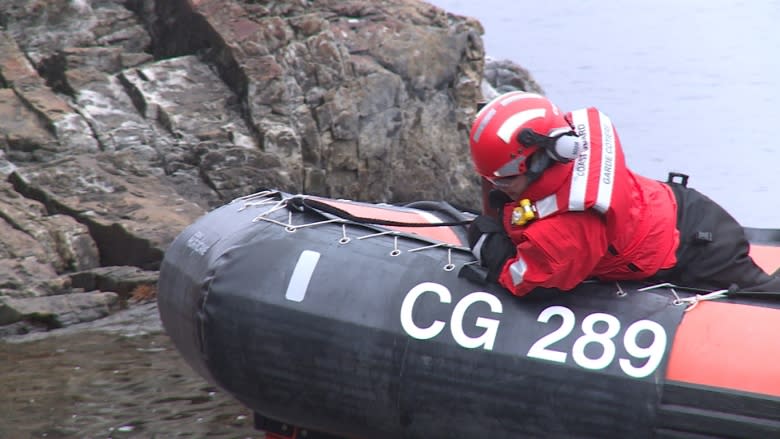Students psyched for summer jobs with inshore search and rescue program
Sophie Thomas hangs over the edge of a Zodiac Hurricane rescue boat and calls out the distance to a cliff on the shores of Bonavista Bay, attempting to rescue a stranded man from the rocks.
Thomas is one of 18 students training to be part of the Canadian Coast Guard's Inshore Rescue Boat (IRB) Service Student Program in Newfoundland and Labrador.
"These last couple of weeks have been absolutely amazing," said Thomas, a post-secondary student from Midland, Ont.
The 16-day training course prepares the students for a summer job with Canadian Coast Guard staff responding to search and rescue calls across the province.
"They've been demanding, learning lots in a very short time but just incredible," said Thomas, who said she has plans for a future career in medicine.
She said the opportunity to work in this province was a major part of her decision to apply.
"Just being away from home, out of my comfort zone a little bit and pushing my limits a little bit," she said.
'Hidden gem' of a program
Colin Baird is a coxswain with the IRB Program from St. John's who started as a student crew member four years ago.
"The best part about this is seeing that when [the participants] come here, they don't know what to expect exactly and then they really do get to fall in love with the province," said Baird, who calls the program a hidden gem.
"There's thousands and thousands of dollars worth of training that you get, put into each individual," said Baird who has worked alongside students that went on to become police officers, doctors, and lawyers.
Baird hopes to use this training experience as a pilot in the Royal Canadian Air Force.
"A lot of the training actually rolls over, especially doing my air crew training in Trenton," said Baird.
Helpful people wanted
Stephen Sheppard is the IRB program coordinator and SAR preparedness officer with the Canadian Coast Guard.
"We're looking for people who want to excel — people who want to be helpful to others both in the marine field and outside the field when they're back to school," said Sheppard.
He said being able to train students from across Canada in N.L. is one of his favourite parts of the program.
"It's very enlightening," said Sheppard. "You take a bunch of people who probably never seen the ocean before or operated ever on a boat before and within a matter of 16 days they're doing very complex maneuvers."
The students hit the water for the first time over the long weekend as full-fledged employees and will work two weeks on, two weeks off for the next 16 weeks.



